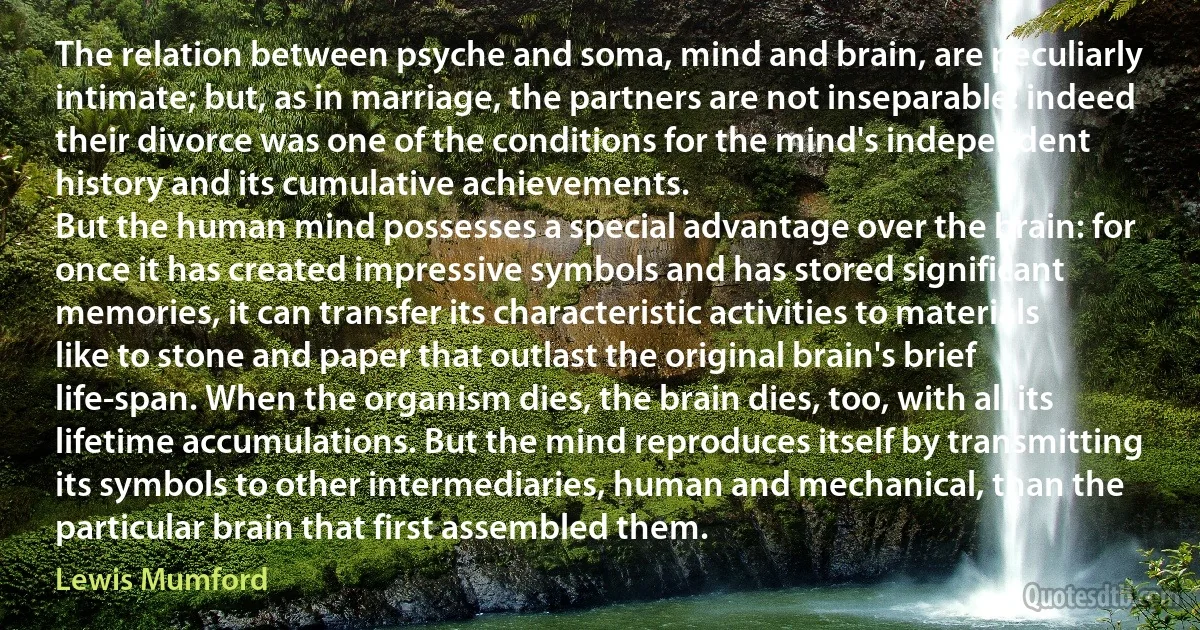Brief Quotes - page 22
As an atheist, Suzuki declares, he has no illusions about life and death, adding that the individual is insignificant in cosmic terms. Human beings must come to terms with the unbearable reality that they, like all life, will be extinguished.
What he finds most difficult, he confides, "is the idea that this guy looking back at me in the mirror, this person locked into my skull full of memories that make him who he is, this fellow who has known pain, joy, thoughts, having existed for such a brief flash in all eternity, is going to vanish forever at his death. Forever is such a long time, and 70, 80, 90, even 100 years is such a tiny interval in all of time."

David Suzuki
Terrible news to report: Seurat died after a very brief illness. I heard the cruel news only this morning. He had been in bed for three days with a disturbance of the throat. Improperly treated, the illness developed with ruinous speed. It is my impression that the malady was the very one de Bellio told me about some time ago: diphtheria. The funeral takes place tomorrow. You can conceive the grief of all those who followed him or were interested in his artistic researches. It is a great loss for art.. .There is a splendid exhibition of that unfortunate Seurat [at the exhibition of the Independants, March 1891]; some marines, as delicate as ever, somewhat white and weak in coloration, but very artistic, and a large canvas, a 'Circus' which is excellently composed; a clown cut on the foreground dissatisfies us, but the work as a whole has the stamp of an original artist, it is something!

Georges Seurat
Looting. Rape. Kidnappings. Murder. Where no one had cared about Pakistan when I arrived at Harvard, now everyone did. And the condemnation of my country was universal. At first, I refused to believe the accounts in the Western press of atrocities being committed by our army in what the East Bengal rebels were now calling Bangladesh. According to the government-controlled Pakistani papers my parents sent me every week, the brief rebellion had been quelled. What were these charges then that Dacca had been burned to the ground and firing squads sent into the university to execute students, teachers, poets, novelists, doctors and lawyers? I shook my head in disbelief. Refugees were reportedly fleeing by the thousands, so many of them strafed and killed by Pakistani planes that their bodies were being used to erect road blocks.

Benazir Bhutto
Reverence for greatness dies out, and is succeeded by base envy of greatness. Every man is in the way of many, either in the path to popularity or wealth. There is a general feeling of satisfaction when a great statesman is displaced, or a general, who has been for his brief hour the popular idol, is unfortunate and sinks from his high estate. It becomes a misfortune, if not a crime, to be above the popular level.
We should naturally suppose that a nation in distress would take counsel with the wisest of its sons. But, on the contrary, great men seem never so scarce as when they are most needed, and small men never so bold to insist on infesting place, as when mediocrity and incapable pretence and sophomoric greenness, and showy and sprightly incompetency are most dangerous.

Albert Pike
The law of simplicity and naïveté applies to all fine art, for it is compatible with what is most sublime.
True brevity of expression consists in a man only saying what is worth saying, while avoiding all diffuse explanations of things which every one can think out for himself; that is, it consists in his correctly distinguishing between what is necessary and what is superfluous. On the other hand, one should never sacrifice clearness, to say nothing of grammar, for the sake of being brief. To impoverish the expression of a thought, or to obscure or spoil the meaning of a period for the sake of using fewer words shows a lamentable want of judgment.

Arthur Schopenhauer
Ignatius, for understandable reasons, is the saint I know better than any other. He founded our Order. ... Jesuits were and still are the leavening - not the only one but perhaps the most effective - of Catholicism: culture, teaching, missionary work, loyalty to the Pope. But Ignatius who founded the Society, was also a reformer and a mystic. Especially a mystic. ... They have been fundamental. A religion without mystics is a philosophy. ... I love the mystics; Francis also was in many aspects of his life, but I do not think I have the vocation and then we must understand the deep meaning of that word. The mystic manages to strip himself of action, of facts, objectives and even the pastoral mission and rises until he reaches communion with the Beatitudes. Brief moments but which fill an entire life.

Ignatius of Loyola
How strong were the feelings surging in my heart may be seen in a brief extract from an article published second week of January, 1885: "Christian charity? We know its work. It gives a hundred-weight of coal and five pounds of beef once a year to a family whose head could earn a hundred such doles if Christian justice allowed him fair wage for the work he performs. It plunders the workers of the wealth they make, and then flings back at them a thousandth part of their own product as 'charity.' It builds hospitals for the poor whom it has poisoned in filthy courts and alleys, and workhouses for the worn-out creatures from whom it has wrung every energy, every hope, every joy. Miss Cobbe summons us to admire Christian civilisation, and we see idlers flaunting in the robes woven by the toilers, a glittering tinselled super-structure founded on the tears, the strugglings, the grey, hopeless misery of the poor." Chapter XIII Socialism.

Annie Besant
The loss of belief in reincarnation, and of a sane view as to the continuity of life, whether it were spent in this or in the next two worlds, brought with it various incongruities and indefensible assertions, among them the blasphemous and terrible idea of the eternal torture of the human soul for sins committed during the brief span of one life spent on earth.

Annie Besant
My Soul gave me good counsel, teaching me not to measure time by saying, "It was yesterday, and will be tomorrow." Before my Soul taught me, I imagined the past as an era not to be met with, and the future as an age that I would never witness. But now I know that in the brief moment of the present, all time exists, including everything that is in time - all that is eagerly anticipated, achieved, or realized.
My Soul gave me good counsel, teaching me not to define a place by saying 'here' or 'there'. Before my Soul taught me, I thought that when I was in any place on the earth I was remote from every other spot. But now I have learned that the place where I subsist is all places, and the space I occupy is all intervals.

Kahlil Gibran
Since it is always the same person whose mind thinks, wills, and judges, the autonomous nature of these activities has created great difficulties. Reason's inability to move the will, plus the fact that thinking can only "understand” what is past what neither remove it nor "rejuvenate it” ... have led to the various doctrines asserting the mind's impotence and the force of the irrational, in brief to Hume's famous dictum that "Reason is and ought only to be the slave of the passions,” that is, to a rather simple-minded reversal of the Platonic notion of reason's uncontested rulership in the household of the soul. What is so remarkable in all these theories and doctrines is their implicit monism, the claim that behind the obvious multiplicity of the world's appearances and, even more pertinently to our context, behind the obvious plurality of man's faculties and abilities, there must exist a oneness - the old hen pan, "the all is one” - either a single source or a single ruler.

Hannah Arendt
I was brought up in the Christian religion, and although I can scarcely sanction all the improper attempts to gain the emancipation of woman, all paganlike reminiscences also seem foolish to me. My brief and simple opinion is that woman is certainly as good as man-period. Any more discursive elaboration of the difference between the sexes or deliberation on which sex is superior is an idle intellectual occupation for loafers and bachelors.

Søren Kierkegaard
Forty-odd years ago, there was a countercultural moment, a brief, shining moment, as it were, when the eyes of a generation glimpsed the Eden beneath the veil. However fleeting was this paradise, or however harsh has been its repression, its light nonetheless inspired a rowdy cohort of artists to carry its torch into the future. Tom Robbins is one of these unruly pioneers, and his frequently bestselling novels are so saturated in an uncontainable joie de vivre that they have remained virtually required reading throughout the years and decades since their initial publication.

Tony Vigorito
I almost always feel inclined, when I happen to say anything to soldiers, to impress upon them in a few brief remarks the importance of success in this contest. It is not merely for to-day, but for all time to come that we should perpetuate for our children's children this great and free government, which we have enjoyed all our lives. I beg you to remember this, not merely for my sake, but for yours. I happen temporarily to occupy this big White House. I am a living witness that any one of your children may look to come here as my father's child has.

Abraham Lincoln
How strange is the lot of us mortals! Each of us is here for a brief sojourn; for what purpose he knows not, though he sometimes thinks he senses it. But without deeper reflection one knows from daily life that one exists for other people - first of all for those upon whose smiles and well-being our own happiness is wholly dependent, and then for the many, unknown to us, to whose destinies we are bound by the ties of sympathy. A hundred times every day I remind myself that my inner and outer life are based on the labors of other men, living and dead, and that I must exert myself in order to give in the same measure as I have received and am still receiving... .

Albert Einstein


